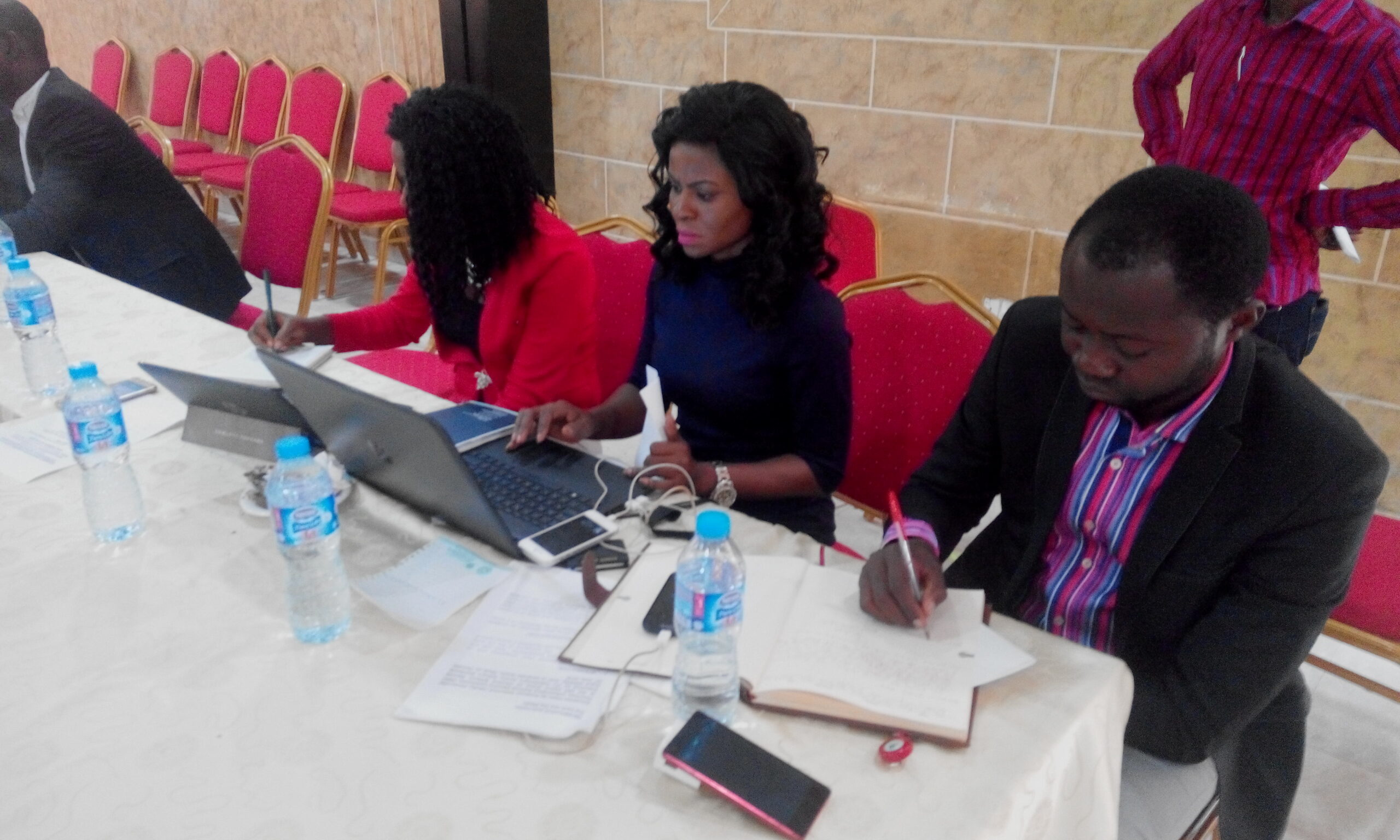The Independent Service Delivery Monitoring Group (ISDMG) convoked a two day civil society/stakeholders roundtable on education between the 26th and 27th March, 2012 at the Merit House, Abuja. The roundtable was put together as a dispassionate interrogation of the activities of the Parastatals in the education sector by civil society organizations given the over N3 trillion that has been committed to education by the Federal Government since 1999. The two day roundtable that was put together which was sponsored by Netlinks Synergy Limited had the Secretary to the Government of the Federation, Senator Anyim Pius Anyim, GCON represented by the Permanent Secretary (General Services Office) in the Office of the Secretary to the Government of the Federation as the Special Guest of Honour and the Minister of Education, Prof. Ruqayyatu Rufai as the distinguished Chairman of the event. The roundtable attracted participants from civil society organisations, the media, the academia, management of higher institutions of learning in Nigeria, agencies within the nation’s education sector including the Tertiary Education Fund (TETFUND), the Petroleum Technology Development Fund (PTDF), the National Universities Commission (NUC), the National Commission for Colleges of Education (NCCE), the National Board for Technical Education (NBTE), the National Open University (NOUN), the Universal Basic Education Commission (UBEC), National Commission for Colleges of Education and Nigerian Educational Research and Development Council (NERDC) amongst others.
The Chairman of the roundtable and Minister of Education, Prof. Ruqayyatu Rufai in her opening remarks said that the education system is for all Nigerians and that the Federal Government cannot carry the load alone and reiterated that government is partnering with civil society to find lasting solutions to challenges facing the educational system. She went on to state that the present administration is ready to implement every good recommendation made at the forum adding that Government is concerned about raising the quality of the nation’s education. The Special Guest of Honour and Secretary to the Government of the Federation, Senator Anyim Pius Anyim in his keynote address urged stakeholders to come up with appropriate measures to end the recurring industrial unrest within the sector. Going further, he said that the massive drift of young Nigerians even to neighbouring countries with lower standards to seek further education is worrisome and charged participants to search for ways to restore the lost glory of Nigerian education system. He concluded by commending the foresight and patriotism of the organisers at awakening the consciousness of all stakeholders to the realities of the dire straits in which the nation’s education system is currently wallowing.
The roundtable which had seven sessions in all had thematic paper presentations on “Tertiary Education Trust Fund and the Transformation of Education in Nigeria” by Prof. Mahmood Yakubu
Executive Secretary Tertiary Education Trust Fund (TETFund), “Imperatives of Efficient and Effective Curriculum Development as a Tool for National Transformation” by Prof. Godswill Obioma, the Executive Secretary, Nigeria Educational Research and Development Council (NERDC), “National Vocational Qualification Framework (NVQF): A New Deal For Nigeria’s Skills Development” Dr. M. A. Kazaure, Executive Secretary National Board for Technical Education (NBTE), Meeting 21st Century Educational Challenges Through Quality Technical Education” by Dr. Muttaqha Rabe Darma, ”Laying the Foundation for Quality Through Efficient Basic Education System by Dr. Ahmed Modibbo Mohammed, Executive Secretary Universal Basic Education Commission (UBEC), ”Restoring Standards Through Effective Regulation” by Prof. Julius Okojie, Executive Secretary, National Universities Commission (NUC) and ”Reforming Teacher Education For Nation Building” by Prof. M. I. Junaid, Executive Secretary, National Commission for Colleges of Education (NCCE). Key civil society actors/leaders, Jaiye Gaskiya, Barr. Wisdom Dureke, Dr. Abubakar Umar Kari, Barr. Clem Nwankwo, Dr. Rakiya Abaji Abdulkadir, Barr. Abdul Mahmud, Mazi Emmanuel Onyema, Oludare Ogunlana, Zayyan Tambari Yabo discussed the papers.
The Roundtable after two days of intensive deliberations on the state of Nigerian education made the following observations;
1. Participants unanimously noted the undisputable sorry state of the nation’s education and the need for all stakeholders to rise to the challenges of restoring the lost glory of Nigeria’s education sector
2. While noting the tremendous efforts by the various interventionist agencies at addressing the challenges in the education sector, equally observed that there exists a major gap that can only be filled when the relevant levels of government become alive to their responsibilities especially to the area of the vexed issue of funding rather than abdicating such to the interventionist agencies
3. While commending the measures being undertaken by the NERDC at bringing the education curriculum in tune with present realities, participants frowned at the curriculum at every level of education which falls far short of the realities of the times and also notes that if the education sector must meet the developmental aspirations of the country there is a need for a radical review and transformation of the nation’s education curriculum to meet the challenges of the 21st century.
4. Participants noted that the nation’s philosophy of education at all levels must shift from mere preparation of citizens for the market place to that of developing the totality of the human person.
5. Participants while resoundingly applauding the Executive Secretary of the TETFUND for his unrivalled transparent and open management style in conducting the affairs of the TETFUND, called on the management of beneficiary institutions and other parastatals in the sector to take a cue from his sterling qualities
6. Participants while noting the invaluable impact the interventions of the TETFUND have had on the educational sector, commended the Federal Government for refocusing the agency to the challenges of tertiary education.
7. Participants while calling on the Federal Government to take seriously the National Vocational Qualification Framework (NVQF) being promoted by the National Board for Technical Education (NBTE), warned that if Nigeria is to meet her industrialisation goals, the NBTE must be strengthened to produce skilled manpower for the nation’s industrial sector from both the formal and informal sectors
8. Participants while expressing confidence in the various programmes being put in place by the National Commission for Colleges of Education (NCCE) to make teaching a vocation of choice in a bid to fill the acute teaching staff deficits in the sector called for government’s continued commitment in this regard.
9. Participants while commending the Universal Basic Education Commission (UBEC) for its Community Accountability and Transparency Initiative (CATI), urged the Commission to update the report so as to allow for effective community monitoring and assessment of its project.
10. Participants lauded the University Upgrade Programme of the PTDF which was noted to have a huge potential multiplier effect on the oil and gas sector in particular and the economy at large.
11. Participants noted with glee the strides of the Ministry of Education in the area of refocusing Tertiary education especially with the inauguration of the Needs Assessment Committee.
12. Enjoins the Government to ensure that academic calendar of institutions are not disrupted as the regular disruption accounted for the largest singular reason for young Nigerians to seek further education outside the country.
Flowing from the above observations by participants, the roundtable made the following recommendations-
1. Notwithstanding the existence of the education interventionist agencies, participants called on government at all level to be alive to their fundamental duties of investing in the education of Nigerians as tool for the realisation of its developmental aspirations and not abandon the funding of education and educational development to the interventionist agencies. Interventionist agencies remain largely interventionist and are not a substitute for the duty of governments at all levels to funding education
2. That curriculum development must reflect the critical developmental needs of the Nigerian economy for education to be relevant and accordingly recommend that the review of educational curriculum in the country must of necessity be tied to the nation’s developmental aspirations and objectives
3. That the nation’s educational philosophy must put at its centre-piece the fundamental need to develop Nigerian citizens as the agents of development rather than viewing education primarily as a process of producing people to meet market demands
4. That transparency and probity must of necessity be enthroned in the sector if the resources being committed in the sector by the interventionist agencies and the government is to produce the desired results of a revamped educational sector in the country
5. That measures should be put in place to ensure the retention of trained manpower especially those developed with public resources by the interventionist agencies in the public sector for the collective good
6. That the role of the informal sector in producing skilled manpower for the economy must be recognised and efforts made to mainstream the informal sector into the nation’s educational development efforts and appropriate mechanisms for recognising expertise by the informal sector be put in place via the National Vocational Qualification Framework (NVQF)
7. That teachers’ training and development schemes be accelerated and the remuneration for teachers be improved upon as a means of attracting the nation’s best brains to the teaching profession.
8. That the high impact intervention project scheme of the TETFund must be sustained given that six beneficiary institutions of the scheme have broken the top 50 ranking of universities in Africa.
9. That heads of institutions be made to account for every naira received by their institutions as the value to money ratio in most institutions was assessed to be very low necessitating the unending call for more funding.
10. That other MDAS emulate the contract award mechanism of the TETFund and UBEC which has eradicated “the abandoned projects syndrome”
11. That the NUC should immediately prosecute operators of illegal campuses who fleece millions of gullible Nigerian youths seeking further education.
The roundtable ended with words of commendation for the Independent Service Delivery Monitoring Group (ISDMG) for the initiative and good will messages from participants with the call for regular interaction between agencies in the nation’s educational sector and civil society as a means of aggregating policy options for addressing the nation’s educational challenges.
Ezenwa Nwagwu
Lead Facilitator
President: Coalition to Save Education in Nigeria
COSEN.
Babatunde Oluajo
National Secretary:
Zero Corruption Coalition
Dr. Chima Amadi
Executive Director
(ISDMG)

